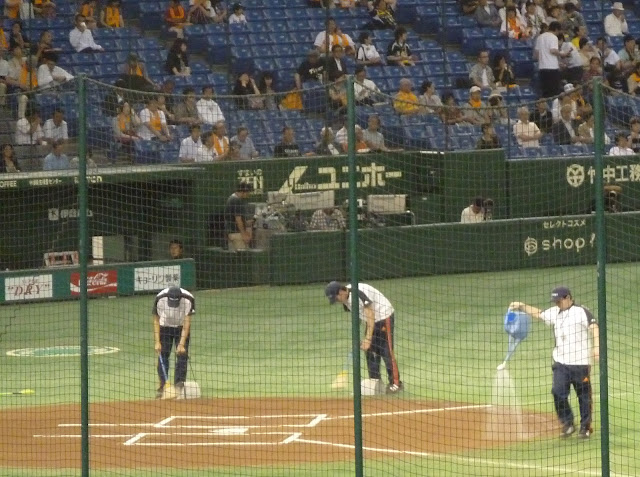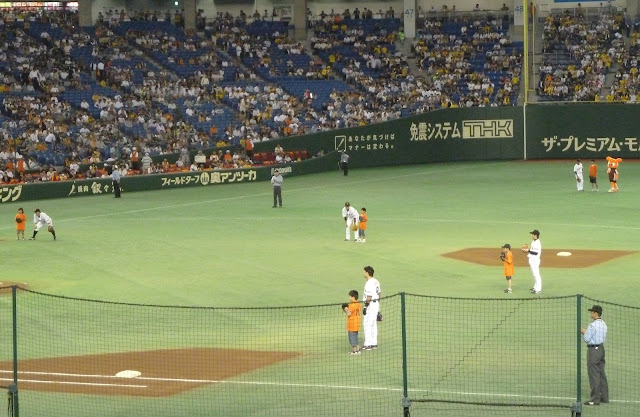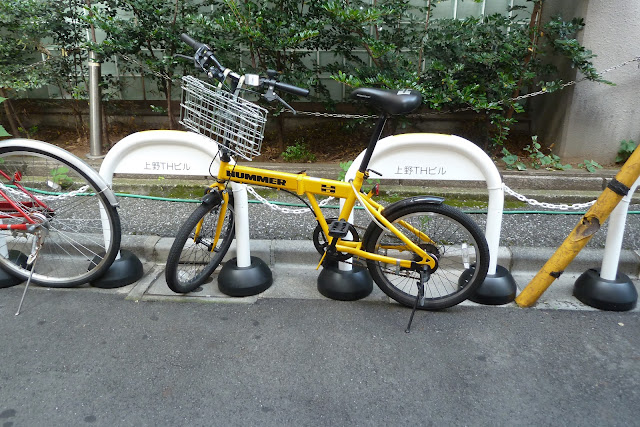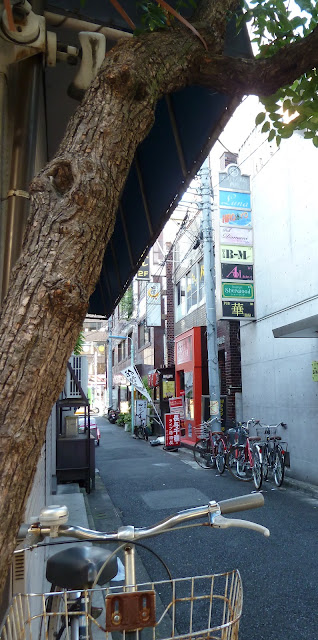(Japanese) Baseball
My love of Japan notwithstanding, sometimes I feel a little homesick. The fix? Baseball, of course! No matter how far through the looking glass this Japanese adventure takes me, I can always regroup with the entire fam while we take in a little good old fashioned hardball. Not content to watch our beloved Mets fritter away another season on MLB.com, we headed to a Yomimuri Giants game at the Tokyo Dome to get a baseball fix. (The Yomimuri Giants are to Japan what the Yankees are to the U.S.) We learned a few things along the way.Cue the music, "Centerfield," courtesy of John Fogerty:
Just like home, you can watch batting practice:
 |
| Note: Mets shirt; Yomimuri Giants hat |
Score programs and coupons and other cool stuff:
 |
and (flavored) popcorn (soy sauce is a popular flavor in Japan):
However, you may be disappointed to learn that there are a few differences here. You cannot get cotton candy. Or Crackerjacks. Or pretzels. But, on the bright side, you can get Japanese food:
 |
| Nothing like a bowl of noddles with your baseball game. |
(Fenway Park sells steaming hot chowder all summer long, so the noodles and sushi didn't phase me too much.) And (thank God) beer. Just like in the U.S., you can even get beer served to you right in your seat. But I must tell you: the Japanese have one-upped their American counterparts. In Japan, they have Beer Ladies. No sweaty, loud-mouthed middle-aged man named Lou hawking Bud Light with "Beeua hir" (That's "Beer here," for those of you who have never been to an MLB game on the East Coast.) That would never do in Japan. It's not kawaii (cute). Remember: cute sells. Apparently it sells everything from Hello Kitty t-shirts to beer at baseball games.
The Beer Ladies all wear matching uniforms and smiles, and they run at frightening speeds up and down the steps with portable keg backpacks. (Yes, Homer, I know. Beer backpacks. Genius. Sheer Genius.) If I could have bought one of these beer backpacks and shipped it home, I promise I would have done it. All I'd need is a street vendor permit/liquor license in NYC and I'd be rich. Rich I tell you. Rich! But I digress. Without further ado, Beer Ladies, just for you, my faithful Storybook Days reader:
 |
| Kirin Beer Lady |
 |
| The pink flower adds a nice touch, don't you think? |
 |
 |
| Is it just me, or does this look like a screen shot from a SF Giants game (except for the kana letters)? |
Loyal fans wave orange towels whenever there is an RBI:
So what makes the experience completely Japanese, you ask?
The cheerleaders and mascots, for one:
 |
| Kawaii desu nee! (VERY cute!) |
 |
| There is no such thing as too many mascots. |
 |
| One cheerleader (check out the summer-time legwarmers) and three lucky fans leading cheers from the field before the game. |
 |
| Sweeping the baseline. Yes, sweeping. With a broom and dustpan. |
 |
| More sweeping. And watering. With a watering can. |
 |
| My FAVORITE part of the game. The first pitch is thrown out by a kid and fielded by kids. Each position has a kid and a Yomimuri Giants team member playing it. It was so cool. MLB should take note. |
 |
| Guess who sponsors the helmets? Now THAT'S American! |
The game we saw had the Yomimuri Giants playing the Hanshin Tigers, Japan's version of Yankees v. Red Sox. It was a Friday evening. We figured it would be packed, and (eventually) it was, but it was clearly not the baseball crowd I expected.
Most of the fans were men in business suits and the mood was subdued, though folks did get excited when there was an RBI. The game itself moved along perfunctorily. No arguments with the ump. No flashy plays. No fans ejected. Nobody screamed out that the Tiger's red-headed pitcher sucked (though he did). Just technically precise, polite and efficient baseball. The game was there, but the life was drained out of it.
The family and I left the game early feeling pretty disappointed. I had hoped to see the fabled Japanese love of baseball. It definitely exists, but not in the way I had imagined. In Japanese baseball, honor and pride come first and the team, coach and players are focused on honoring the tradition, not the player or even the team. I knew all this going in, but I guess I thought that things might be a bit different now that it is 2012 and there are several successful Japanese baseball players in the U.S. Many U.S. players (even former MLB players like Benny Agbayani), have long careers in Japan. Bobby Valentine coached in Japan for years and is absolutely adored (and perhaps, after his season in Boston this year, he should return there?). Was I naive to expect a more Americanized game? Maybe.
But maybe not. It turns out that there's a new breed of owner in Japanese baseball. DeNA, a small start-up gaming company in Japan, recently bought the lowly Yokohama Baystars. The Baystars have come in dead last their six-team Central League in 8 of the last 10 seasons. The goal of DeNA? To inject life into the team? Maybe. In the words of the team's new chief executive, Harvard-educated Jun Ikeda, DeNA wants to "...do something in the baseball world. It could improve our [DeNA] brand." (Ken Belson, NY Times) Now THAT'S American! (If it works, maybe they'd be interested in the Mets?)
For more on DeNA and the Yokohama Baystars, read Ken Belson's article in The New York Times.
























































